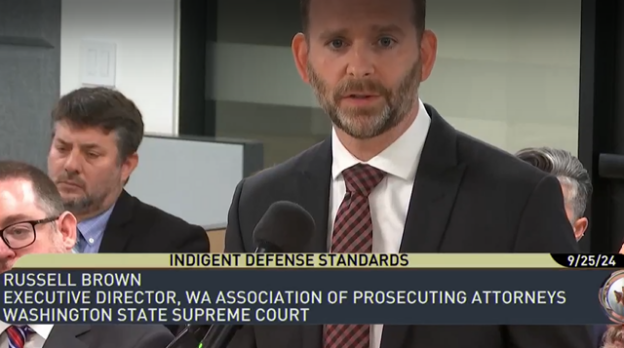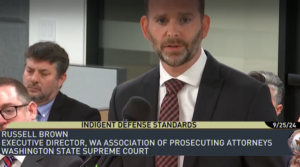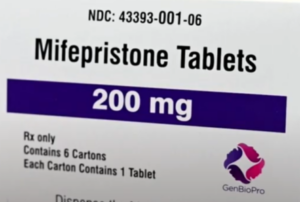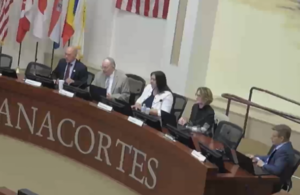Note: The following e-newsletter was sent to Sen. Padden’s subscribers October 2, 2024. To subscribe to Sen. Padden’s newsletter, click here.
Dear friends and neighbors,
Previously, in an earlier e-newsletter, it was mentioned that the state Supreme Court is considering a controversial proposal from the Washington State Bar Association to address the low number of public defenders in our state.
The Washington State Bar Association has forwarded a set of revised standards for indigent-defense attorney caseloads to the Supreme Court.
The phased-in proposal allows public defenders to reduce felony cases by 70 percent and misdemeanor cases by 60 percent.
The Supreme Court is accepting public comments on these recommendations through October 31. It also is holding two public hearings on this issue. The first hearing was Wednesday, September 25, with the second scheduled for November 13 in Olympia.
The September 25 hearing, which was over three hours, attracted representatives from several organizations opposing the plan.
KING-TV in Seattle covered the public hearing. The KING story included quotes from two officials who criticized the proposal on behalf of the Washington State Association of Counties and Association of Washington Cities.
“If adopted and implemented, these standards will, at minimum, double or triple county costs without increased funding for these services,” said Derek Young with the Washington State Association of Counties.
“Implementation of the recommended revisions to the standards for indigent defense could cost cities alone upwards of 400 million dollars annually more than their current expenses,” said Deanna Dawson with the Association of Washington Cities. “Local jurisdictions would have approximately 30 months to triple the number of defense attorneys.”
A story published last week by The Center Square included quotes by Steve Strachan, the executive director of the Washington Association of Sheriffs and Police Chiefs, who criticized the state bar association’s recommendations as dangerous. From the story:
“The defense attorneys went to the state bar and said they should only have to handle one-third of the cases they currently do,” he explained.
In March, WSBA recommended new maximums for a public defender of no more than 47 felony or 120 misdemeanor cases in one year’ time, depending on the seriousness of the cases.
That would require far more attorneys to handle the reduced caseload maximums.
“It would result in the dismissal of very serious cases because there wouldn’t be the capacity to handle those cases,” Strachan said.
Russell Brown of the Washington Association of Prosecuting Attorneys testified against the Washington State Bar Association’s proposal related to the shortage of public defenders in the state.
TVW’s coverage of this first Supreme Court-hosted public hearing includes testimony against the bar association’s proposal made by many officials, including Young of the counties association; Dawson of the cities association; Russell Brown, the executive director of the Washington Association of Prosecuting Attorneys; and Taylor Gardner, deputy policy director for the Washington Association of Sheriffs and Police Chiefs.
You can only hope the Supreme Court responds to such widespread opposition by rejecting the state bar association’s flawed proposal and urging the WSBA to come back with a better proposal that not only addresses the concerns expressed but also – and this is very important – doesn’t hamper public safety by allowing criminal suspects to walk free instead of being tried and possibly convicted.
Thank you, as always, for the honor of representing you in Olympia!
Best Regards,
Senator Mike Padden
“Inside Olympia” interview to air on TVW Thursday at 7 p.m.
As mentioned in my most recent e-newsletter, I sat down for a “farewell interview” with Austin Jenkins, the host of TVW’s Inside Olympia show. The interview focused on my 28-year career in the Legislature and some of the key issues I focused on during my years in the House and Senate. The interview will be shown for the first time on TVW this Thursday (October 3) at 7 p.m.
Possible solution for license plate delays?
My previous e-newsletter discussed why it has taken longer for vehicle owners to receive new license plates. The short answer is that there are fewer inmates in the state’s corrections system who are making these plates.
The state Department of Licensing last week announced somewhat of a solution to this frustrating problem. DOL says it is temporarily printing non-embossed license plates to address the shortage that has been going on for months at licensing offices around Washington. DOL posted an item on its website that discussed the benefit of creating non-embossed plates instead of making the regular embossed plates. Here is part of the DOL post:
The process of creating an embossed license plate — which has raised letters and numbers — requires an extra step that involves manual labor. That means they take longer to produce than non-embossed plates, which can be printed using one machine.
By printing non-embossed plates, DOC believes it may be able to eliminate the shortage within six to eight weeks.
Otherwise, the shortage may persist for several months. DOL is issuing temporary paper license plates that expire after 60 days, which means customers must renew them if they haven’t received permanent plates by then. That’s not an effective long-term solution.
For more information about this issue, or if you have questions, contact Beau Perschbacher, the policy and legislative director for DOL, at bperschbac@dol.wa.gov.
Inslee insists on keeping stockpile of abortion pills
Several months ago, I mentioned in an e-newsletter about Governor Inslee’s purchase of a three-year supply of mifepristone, known as the “abortion pill.” He arranged for the expensive purchase before the U.S. Supreme Court issued a ruling on a ban on mifepristone, obviously out of fear that access to the abortion pill would be restricted. In June of this year, the Supreme Court threw out a lawsuit that tried to roll back access to mifepristone. Now, you’d think that the SCOTUS ruling preventing the abortion-pill ban would prompt our governor to get rid of the stockpile. Guess again.
A recent video shows that the governor is insisting that the state will keep the mifepristone stockpile, despite the Supreme Court ruling. Watch the video for yourself.
Attending Senate committee meetings
The Senate Law and Justice Committee met in Anacortes two weeks ago.
While on the west side of the Cascades two weeks ago, I attended two Senate policy committees that were held in communities outside of Olympia.
On September 17, the Senate Transportation Committee met in Bremerton. It held a work session on the structural funding challenges facing the state transportation budget. You may watch a video of the committee meeting here.
Two days later, on September 19, the Senate Law and Justice Committee gathered in Anacortes. Its work session covered a Criminal Justice Training Commission update, as well as updates on victim services and the Internet Crimes Against Children Task Force. Watch the video of the meeting here.
Upcoming event for EWU computer-science department
This Friday my wife, Laura, and I will attend the 40th Anniversary Celebration of Eastern Washington University’s computer-science department. The event is at the university’s Catalyst Building in Spokane. It will be a chance to talk with local people working in the technology sector, as well as EWU President Shari McMahan, faculty and students.

















